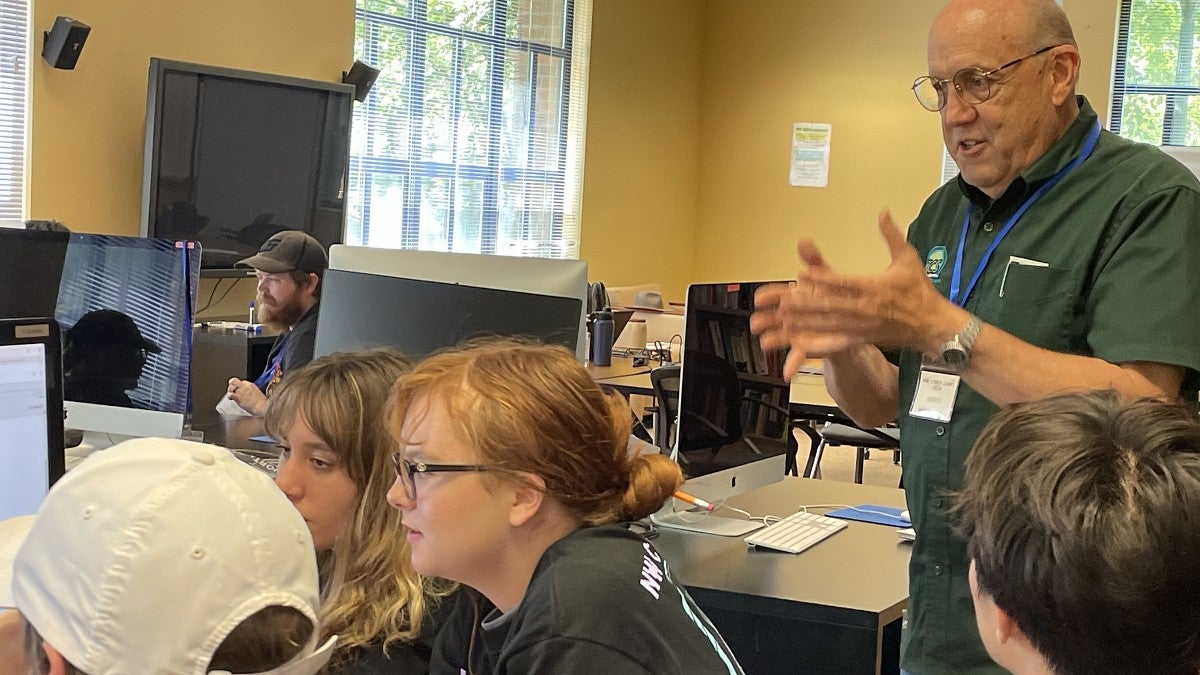
As the world becomes increasingly digital, the need for skilled cybersecurity professionals is urgent. However, statistics from the National University show the field continues to draw predominantly white males while lacking representation from minority groups.
The College of Arts and Sciences’ Computer Science Department, which introduced a cybersecurity major last fall, is now working to strengthen its newest major while also providing career opportunities for underrepresented students across Oregon.
The department received a $500,000 grant from the Higher Education Coordinating Commission (HECC) through the Future Ready Oregon program to fund an outreach initiative in Oregon high schools that will help encourage students to pursue cybersecurity careers.
Established with the passage of Senate Bill 1514 in 2022, Future Ready Oregon aims to provide career preparation opportunities to individuals from underserved communities at any stage of their education.
This grant focuses on three key goals: partner with Oregon high schools with high numbers of underrepresented students to introduce them to cybersecurity and encourage them to pursue a career in the field; develop a statewide, culturally responsive cybersecurity curriculum for high schools; and provide additional support to underrepresented students already enrolled in the cybersecurity program at the University of Oregon—including auditing the current curriculum through a diversity, equity and inclusion lens.
Inspiring high school students
Each month, a team of project members, student ambassadors and cybersecurity professionals will visit partner high schools around Oregon to spark interest in cybersecurity through hands-on exercises and other engaging activities.
“Our team will periodically visit each high school to inform them about the field of cybersecurity, its importance for our society and the opportunity to pursue an exciting career with many high paying jobs in this field,’” says Reza Rejaie, head of the UO Computer Science Department, associate director of the Oregon Cybersecurity Center of Excellence, and primary investigator for the HECC grant. “We want to make sure they give cybersecurity a real chance.”
By partnering with five high schools with high populations of underrepresented students, Rejaie hopes to build strong relationships with these communities. He also plans to include UO admissions and financial aid staff to help students apply for scholarships and show them that cybersecurity is a feasible career pathway as they plan for college.
The department will also offer a customized tour of the UO campus, including the cybersecurity labs, for interested students.
“The tours might be in a different language or include meeting with the multicultural center to accommodate diverse and underserved students,” Rejaie says. “We would love for their families to come, as well, so their parents can encourage them. The goal is to show these students that they belong at our school.”
Sparking an early interest in cybersecurity
The department will also implement a cybersecurity course in Oregon high schools to generate interest in the cybersecurity field and create a pipeline that will funnel diverse talent into the workforce.
“We are working with teachers and underrepresented students to develop a curriculum,” Rejaie says, adding that this collaborative approach will help ensure the courses are not only engaging, but also address diversity, equity and inclusion issues. “We need to see which elements might be culturally sensitive and which elements may need to have a project more appropriate for certain groups.”
This project will span two years, during which students and teachers will participate in workshops and pilot classes to provide feedback. Once finalized, the curriculum will be distributed to schools statewide through the Oregon Department of Education.
“We can get them interested through those classes, not just outreach,” says Rejaie, who hopes to build excitement among underrepresented students who might otherwise not have the resources to pursue careers in cybersecurity.
Supporting diversity at the college level
To support the success of UO cybersecurity majors from underrepresented backgrounds, the department will offer tutoring as well as a variety of clubs to help build community among students in the program while providing opportunities for mentorship, peer support and collaboration.
“Our goal is to see them go all the way to the end and graduate,” Rejaie says. “If minority students come in, they can get engaged in those clubs and communities, and they will feel completely supported.”
Rejaie sees these clubs as more than just extracurricular activities; they are essential for creating connections that will advance students’ academic and professional lives. For example, they could host networking events with professionals from similar backgrounds to open up opportunities for internships and potential jobs.
Beyond these community-building efforts, Rejaie is also working on identifying aspects of the UO cybersecurity program that might push away underrepresented students.
“If you focus too much on gamification of some aspect of computer science, for example, there are studies that show that girls lose interest,” he says, adding that this underscores the importance of having curricula that reflect the needs and interests of a diverse group of people.
Rather than reinventing the current curriculum, given that it is relatively new, Rejaie wants to re-examine areas where certain groups might not be engaged.
“Do we address these practices in our curriculum? If they are missing or not addressed, we want to incorporate them,” he says.
—By Leo Brown, College of Arts and Sciences
